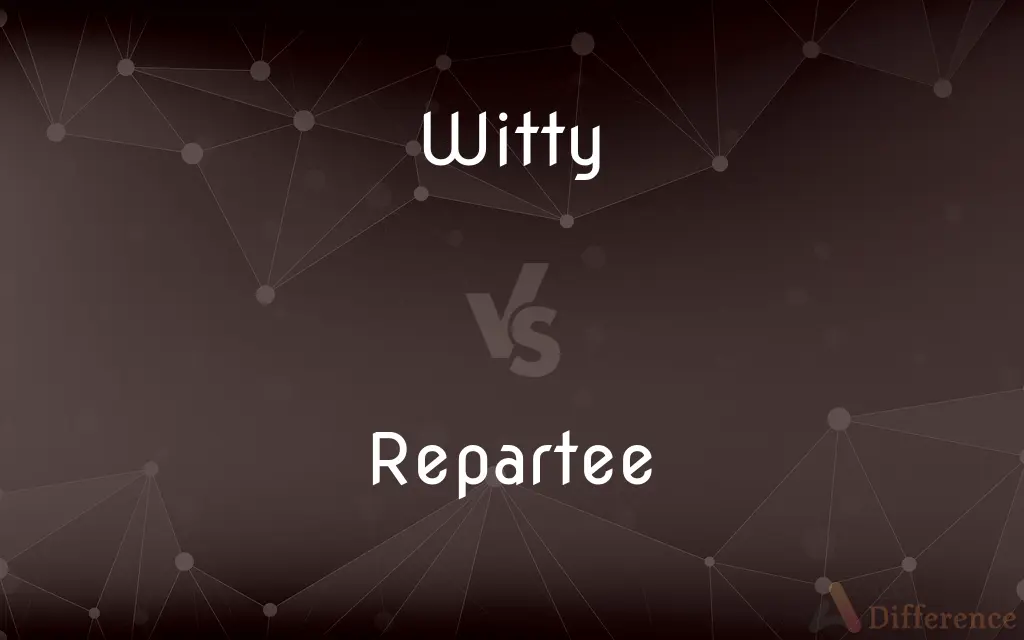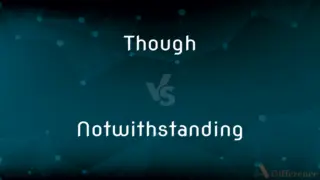Witty vs. Repartee — What's the Difference?
By Tayyaba Rehman & Urooj Arif — Updated on April 4, 2024
Witty involves clever humor and quick thinking, while repartee is the exchange of such witty comments.

Difference Between Witty and Repartee
Table of Contents
ADVERTISEMENT
Key Differences
Witty refers to the quality of being quick to deliver humorous and intelligent remarks. It's a characteristic of a person's speech or writing, showcasing their ability to think on their feet and make others laugh with clever observations or remarks. Being witty is often associated with a sharp intellect and a keen sense of humor, allowing someone to make light of a situation or to entertain through the use of clever language and ideas.
Repartee, on the other hand, is the act or skill of responding to others with witty comments, often in a quick and amusing way. It involves a lively and fast-paced exchange of witty remarks, typically in a conversational setting. Repartee is highly valued in social interactions, as it demonstrates not only one's wit but also the ability to engage effectively with others in a dynamic and entertaining manner.
While wit is an attribute of an individual, enabling them to come up with humorous or clever comments, repartee is the interaction that occurs when two or more individuals engage in this witty exchange. A person can be witty on their own, crafting humorous writing or delivering funny monologues, but repartee requires at least two participants, bouncing wit back and forth in a verbal tennis match of sorts.
Both wit and repartee are celebrated for their ability to elevate conversation, making it more engaging and enjoyable. However, they serve slightly different purposes. Wit can be used to lighten the mood, critique society, or simply entertain, often in a monologic form. Repartee, by its very nature, is dialogic, fostering a dynamic and interactive social exchange that sharpens the participants' minds and entertains the audience.
The distinction also extends to the context in which wit and repartee are used. Wit can be found in written form, such as in literature, articles, or scripted speeches, where the author's cleverness is on display. Repartee, however, is inherently spontaneous and occurs in real-time interactions, requiring not just a quick mind but also the ability to read one's conversational partner and the social context accurately.
ADVERTISEMENT
Comparison Chart
Definition
The quality of being quick and clever in humor
A quick and witty response or conversation
Key Quality
Clever humor
Exchange of witty comments
Mode
Can be solitary (writing/speech)
Inherently social and interactive
Purpose
To entertain, critique, or enlighten
To engage in lively and witty conversation
Context
Both written and spoken forms
Primarily spoken and spontaneous
Compare with Definitions
Witty
Demonstrating quick and inventive verbal humor.
Her witty remarks always livened up the meetings.
Repartee
Witty, quick conversation that is amusing.
The debate turned into an amusing repartee.
Witty
Characterized by quick and inventive humor.
She wrote a witty column that was popular among readers.
Repartee
Conversation or speech characterized by quick, witty comments or replies.
The dinner was filled with lively repartee.
Witty
Having or showing quick and inventive humor.
The playwright's witty dialogue captivated audiences.
Repartee
An exchange of witty remarks.
Their repartee kept the entire room entertained.
Witty
Possessing a sharp and clever humor.
His witty observations about everyday life were hilariously accurate.
Repartee
The ability to engage in witty conversation or retort.
His repartee was as sharp as ever during the interview.
Witty
The ability to say or write things that are clever and usually funny.
His witty comeback left everyone laughing.
Repartee
The skill of making witty and quick responses.
She was known for her sharp repartee.
Witty
Showing or characterized by quick and inventive verbal humour
Marlowe was charming and witty
A witty remark
Repartee
Conversation or speech characterized by quick, witty comments or replies
He had a quick mind and a splendid gift of repartee
Quick-fire repartee
Witty
Demonstrating wit in expression, especially in speech or writing; clever and humorous
A witty commentator on the political scene.
Repartee
A swift, witty reply.
Witty
Characterized by or having the nature of wit; funny or jocular
A witty saying.
Repartee
Conversation marked by the exchange of witty retorts.
Witty
Entertainingly and strikingly clever or original in concept, design, or performance
A witty sculpture.
Witty choreography.
Repartee
A swift, witty reply, especially one that is amusing.
Witty
(obsolete) Wise, having good judgement.
Repartee
A conversation marked by a series of witty retorts.
Witty
(archaic) Possessing a strong intellect or intellectual capacity; intelligent, skilful, ingenious.
Repartee
Skill in replying swiftly and wittily.
Witty
Clever; amusingly ingenious.
His speech was both witty and informative.
Repartee
To reply with a repartee
Witty
Full of wit.
His frequent quips mark him as particularly witty.
Repartee
To have a repartee (conversation marked by repartees)
Witty
Quick of mind; insightful; in possession of wits.
She may have grown older, but she has grown no less witty.
Repartee
A smart, ready, and witty reply.
Cupid was as bad as he;Hear but the youngster's repartee.
Witty
Possessed of wit; knowing; wise; skillful; judicious; clever; cunning.
Repartee
To make smart and witty replies.
Witty
Especially, possessing wit or humor; good at repartee; droll; facetious; sometimes, sarcastic; as, a witty remark, poem, and the like.
Repartee
Adroitness and cleverness in reply
Witty
Combining clever conception and facetious expression;
His sermons were unpredictably witty and satirical as well as eloquent
Common Curiosities
Can wit be too much in social settings?
If not balanced with sensitivity, excessive wit may alienate or offend others.
Is repartee important in conversations?
It can enhance conversations, making them more engaging and enjoyable.
How does wit differ in writing versus speaking?
In writing, wit can be crafted over time, while speaking requires on-the-spot cleverness.
Is repartee always humorous?
While often humorous, it can also be a sharp exchange of ideas.
What makes someone witty?
A combination of intelligence, a sense of humor, and the ability to think quickly.
Can repartee be offensive?
Without care, it can cross lines, highlighting the need for awareness of social cues.
Can wit be used in professional settings?
Appropriately used, it can enhance presentations, meetings, and negotiations.
Does wit require a broad knowledge base?
A wide range of knowledge can provide more material for witty remarks.
Can repartee be learned?
Yes, with practice, observation, and engagement in social conversations.
Are there cultural differences in what is considered witty?
Yes, humor and wit can vary greatly across different cultures.
What role does confidence play in repartee?
Confidence allows for quicker, more assertive responses.
How do I improve my repartee skills?
Listen actively, read widely, and practice engaging in quick-witted banter.
Why is repartee valued in social interactions?
It demonstrates intelligence, social skills, and the ability to entertain.
How do introverts exhibit wit?
Through written communication or well-timed comments in smaller groups.
How can I be witty without being sarcastic?
Focus on positive humor and clever observations that don’t rely on sarcasm.
Share Your Discovery

Previous Comparison
Mop vs. Map
Next Comparison
Though vs. NotwithstandingAuthor Spotlight
Written by
Tayyaba RehmanTayyaba Rehman is a distinguished writer, currently serving as a primary contributor to askdifference.com. As a researcher in semantics and etymology, Tayyaba's passion for the complexity of languages and their distinctions has found a perfect home on the platform. Tayyaba delves into the intricacies of language, distinguishing between commonly confused words and phrases, thereby providing clarity for readers worldwide.
Co-written by
Urooj ArifUrooj is a skilled content writer at Ask Difference, known for her exceptional ability to simplify complex topics into engaging and informative content. With a passion for research and a flair for clear, concise writing, she consistently delivers articles that resonate with our diverse audience.
















































